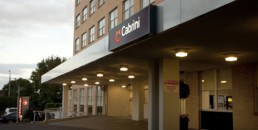Dr David McGaw
Evidence-based decision making and Continuing Professional Development are key principles of Healthy Hearts Melbourne. David is well known for his excellent procedural skills in the Cardiac Lab, his calm and reassuring manner with patients and fellow staff, and his easy, clear communication style. He has a love of teaching students and colleagues in formal teaching programs and proctoring complex procedures and loves to educate patients who are interested in delving deeper into their particular condition.
- Biography
- Interventional Cardiology: Coronary Expertise
- Interventional Cardiology: Heart Valve Expertise
- Interventional Cardiology: Congenital Heart Defects Expertise
- Interventional Cardiology: AF-Related Stroke Prevention Expertise
- Training and Mentoring Interventional Cardiologists
- Ambulance Victoria
- Here is a Little-Known Fact...
Completing his undergraduate education at Monash University, Dr McGaw went on to undertake both his basic physician training and advanced cardiology training at Monash Medical Centre, Clayton. The subsequent three years of intensive studies resulted in the completion of his PhD “Activin and Follistatin: Interactions with Anticoagulants and Arterial Restenosis” – a translational project at both Monash Cardiology and the Monash Institute led by Professor David de Kretser, AC. David then completed his Interventional Cardiology Fellowship. David has had a number of publications and published a book chapter on the percutaneous closure of congenital cardiac defects. He has an ongoing active interest in performing and teaching structural interventional procedures to Cardiologists around Australia.
After 30 years of association with Monash Health, the last 20 years as a Consultant Interventional Cardiologist, David left in 2023 to be able to commit more time to his busy private practice.
David has been a Consultant Interventional Cardiologist at Cabrini Hospital since 2002.
David is an Interventional Cardiologist who performs coronary procedures from the wrist or leg artery. He specialises in ischaemic heart disease, including coronary angiography, coronary stent insertion, Fractional Flow Reserve (FFR), Intravascular Ultrasound (IVUS), and Optical Coherence Tomography (OCT) assessment.
David’s Structural Heart Disease Program includes Heart Valve repairs and replacement using a percutaneous (non-surgical) approach in the Cardiac Catheterisation Lab.
His cardiac valve expertise includes the non-surgical replacement of narrowed aortic valves (aortic stenosis) by transcatheter aortic valve implantation (TAVI). This is performed from the leg artery and patients are routinely discharged home in two or three days.
David also performs non-surgical repair of leaking mitral valves (mitral regurgitation) with the MitraClip device. Patients are routinely discharged home the next day.
David has been instrumental in training other Cardiologists in Heart Valve Procedures around Australia since 2014.
David’s Structural Heart Disease Program includes Heart correcting key Structural Heart Defects using a percutaneous (non-surgical) approach in the Cardiac Catheterisation Lab.
David inserts intracardiac closure devices for atrial septal defects (ASD), patent foramen ovale (PFO), ventricular septal defects (VSD) and patent ductus arteriosus (PDA).
David has been instrumental in training other Cardiologists in these Structural Procedures around Australia since 1998.
David’s Structural Heart Disease Program includes isolation of the left atrial appendage (LAA) using a percutaneous (non-surgical) approach in the Cardiac Catheterisation Lab.
David inserts left atrial appendage occlusion (LAAO) devices for patients at risk of stroke from atrial fibrillation who cannot be treated with anticoagulation. These devices isolate the left atrial appendage, where 90% of clots forms in the setting of AF. This substantially reduces the risk of stroke for these patients.
David has been instrumental in training other Cardiologists in LAAO procedures around Australia since 2012.
David is a key Mentor to Interventional Cardiology Trainees.
He chairs regular informal case-based interventional evenings, which are well attended by trainees from all around Victoria. These meetings foster collegial respect, good communication and, of course, excellence in clinical decision-making and Interventional Cardiology procedures.
David is also involved in the teaching of medical students and junior doctors, both in procedures in the Cath Lab and in consulting on patients at Cabrini.
David is a founding member of the Interventional Cardiology Team that provide 24/7 advice to rural Ambulance Officers who are treating patients with heart attacks.
With his expert advice, the Ambulance Officers are authorised to administer emergency life-saving clot-busting medications in the homes of patients, sometimes hundreds of kilometres and hours from a major hospital.
Do you know that the Baobab tree can grow up to 10 metres in diameter?
The sour Boabab tree seed pulp was the original source of Cream of Tartar, or potassium bitartrate (KC4H5O6). In 1768, it was also discovered that it is deposited as crystals in wine caskets during the fermentation process. The modern method to produce it as a wine-making byproduct is credited to a Swedish chemist named CW Scheele in 1769. In 1832, French physicist Jean Baptiste Biot discovered that these crystals can rotate polarized light. Louis Pasteur, in 1847, discovered that the shapes of its crystals were asymmetrical. In 2021, the crystals are creamed, (or ground) into a white powder and used as both a leavening agent as a key ingredient in baking powder and to prevent sugars from crystalising in confectionery…
David maintains an efficient but relaxed atmosphere in the Cardiac Cath Lab. It is common for his team to contribute a “Little-Known Fact” during their set-up for procedures. Patients are encouraged to join in, so feel welcome to come prepared with a snippet of trivia to amaze!
Consulting Locations
We provide an outpatient consulting service at Suite 47 at Cabrini Malvern as well as providing in-hospital consulting within the hospital where David has a senior medical staff position.
Cabrini Malvern Hospital Facilities
We operate from Cabrini Hospital Malvern, a 508-bed tertiary level Private Hospital offering a wide range of services, including coronary care, day procedures, medical imaging and pathology services for cardiac patients.

Cabrini Malvern
Malvern
Suite 47
183 Wattletree Rd,
Malvern, Victoria, 3144
- (03) 9111 0155
Parking
Paid parking is provided under the hospital via the Coonil Crescent entrance (map above)
Free parking can be found with time restrictions close to the hospital and without time restrictions further from the hospital.